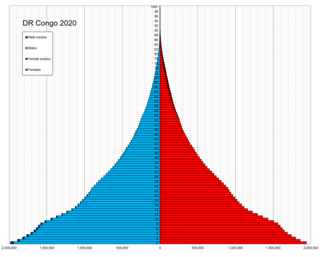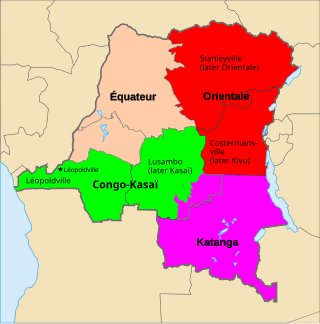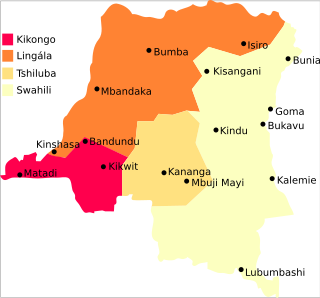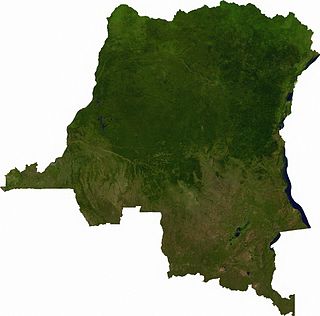Related Research Articles

Demographic features of the population of the Democratic Republic of the Congo include ethnicity, education level, health, economic status, religious affiliations and other aspects of the population.

Katanga was one of the four large provinces created in the Belgian Congo in 1914. It was one of the eleven provinces of the Democratic Republic of the Congo between 1966 and 2015, when it was split into the Tanganyika, Haut-Lomami, Lualaba, and Haut-Katanga provinces. Between 1971 and 1997, its official name was Shaba Province.

Kinshasa, formerly named Léopoldville before June 30, 1966, is the capital and largest city of the Democratic Republic of the Congo. Once a site of fishing and trading villages along the Congo River, Kinshasa is now one of the world's fastest-growing megacities. With an estimated population of 16 million residents, it's the most densely populated city in the DRC and the most populous city in Africa. It is Africa's third-largest metropolitan area and the leading economic, political, and cultural center of the DRC. Kinshasa houses several industries, including manufacturing, telecommunications, banking, and entertainment. The city also hosts some of DRC's significant institutional buildings, such as the Palais du Peuple, Palais de la Nation, Court of Cassation, Constitutional Court, Cité de l'Union Africaine, Palais de Marbre, Stade des Martyrs, Immeuble du Gouvernement, Kinshasa Financial Center, and multiple federal departments and agencies.

The Democratic Republic of the Congo is a country in Central Africa. By land area, the DRC is the second-largest country in Africa and the 11th-largest in the world. With a population of around 105 million, the Democratic Republic of the Congo is the most populous Francophone country in the world. The national capital and largest city is Kinshasa, which is also the economic center. The country is bordered by the Republic of the Congo, Central African Republic, South Sudan, Uganda, Rwanda, Burundi, Tanzania, Zambia, Angola, the Cabinda exclave of Angola, and the South Atlantic Ocean.

The Teke people or Bateke, also known as the Tyo or Tio, are a Bantu Central African ethnic group that speak the Teke languages and that mainly inhabit the south, north, and center of the Republic of the Congo, the west of the Democratic Republic of the Congo, with a minority in the south-east of Gabon. Omar Bongo, who was President of Gabon in the late 20th century, was a Teke.
Mbo or MBO may refer to:

Article 2 of the Constitution of the Democratic Republic of the Congo divides the country into the capital city of Kinshasa and 25 named provinces. It also gives the capital the status of a province. Therefore, in many contexts Kinshasa is regarded as the 26th province.

The Democratic Republic of the Congo is a multilingual country where an estimated total of 242 languages are spoken. Ethnologue lists 215 living languages. The official language, since the colonial period, is French, one of the languages of Belgium. Four other languages, three of them Bantu based, have the status of national language: Kikongo-Kituba, Lingala, Swahili and Tshiluba.

Articles related to the Democratic Republic of the Congo include:
Kako is a Bantu language spoken mainly in Cameroon, with some speakers in the Central African Republic and the Republic of the Congo. The main population centres of Kako speakers are Batouri and Ndélélé in the East Region of Cameroon.

The Chimbu–Wahgi languages are a language family sometimes included in the Trans–New Guinea proposal.

The Republic of the Congo is a country located on the western coast of Central Africa to the west of the Congo River. It is bordered to the west by Gabon, to the northwest by Cameroon, to the northeast by the Central African Republic, to the southeast by the Democratic Republic of the Congo, to the south by the Angolan exclave of Cabinda, and to the southwest by the Atlantic Ocean.

The Hlubi people or AmaHlubi are an AmaMbo ethnic group native to Southern Africa, with the majority of population found in Gauteng, Mpumalanga, KwaZulu-Natal and Eastern Cape provinces of South Africa.
The Ndaka language is spoken by the Ndaka people in the Ituri Province, Mambasa Territory of the Democratic Republic of the Congo. It is lexically similar to the Mbo, Budu, Vanuma and Nyali languages.
The Mbo language is spoken by the Mbo people in the Democratic Republic of the Congo. In 1994 there were about 11,000 speakers. It is lexically similar to the Ndaka and Budu, Vanuma and Nyali languages.
The Budu people (Babudu) are a Bantu people living in the Wamba Territory in the Orientale Province of the Democratic Republic of the Congo. They speak the Budu language.
The Kele people are a Bantu ethnic group of about 160,000 people, in the Democratic Republic of the Congo. They mainly live on the south bank of the Congo River between Kisangani and Isangi. The Kele are a subgroup of The Mongo people.
Vanuma (Bvanuma), or South Nyali, is a minor Bantu language of the Democratic Republic of the Congo. It is lexically similar to Ndaka and Budu, Mbo, and Nyali.
Nyali, or North Nyali, is a minor Bantu language of the Democratic Republic of the Congo. It is lexically similar to Ndaka and Budu, Mbo, and Vanuma.

Democratic Republic of the Congo took part in the 2019 African Games held from 19 August to 31 August 2019 in Rabat, Morocco, with a total of 164 athletes competing in 17 sports, and won 12 medals. The country finished in 27th place in the medal table.
References
- ↑ "Mbo, Imbo of Congo, Democratic Republic of". Joshua Project. Retrieved 2011-10-13.
- ↑ "Mbo". Ethnologue. Retrieved 2011-10-13.